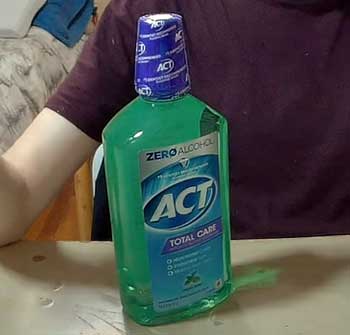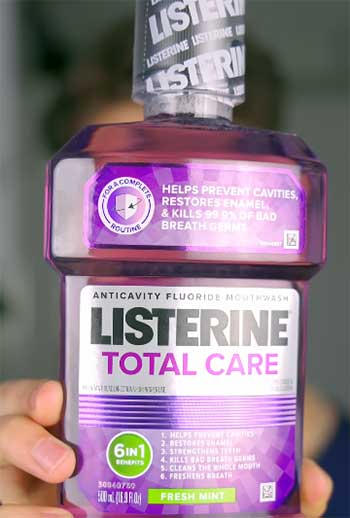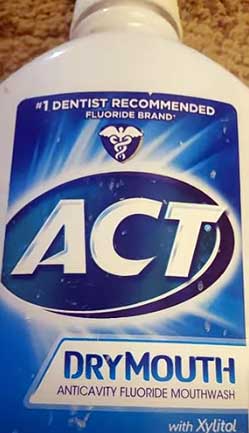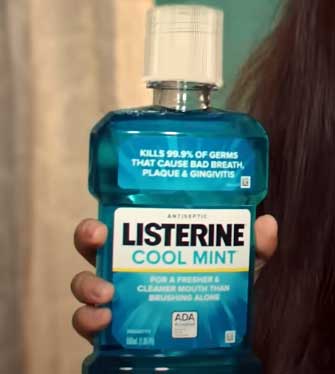I’ve always been a stickler for a fresh, clean mouth, but choosing the right mouthwash can feel like picking a favorite song—there’s so much noise out there, and everyone’s got an opinion.
ACT and Listerine are two heavyweights in the oral care aisle, each promising to keep your teeth sparkling and your breath minty.
My goal here is to break down their key features, weigh their pros and cons, and help you decide which one deserves a spot in your bathroom. Let’s get into it and figure out what’s best for your oral health.
A Brief Comparison Table
| Feature | ACT | Listerine |
| Primary Active Ingredient | Sodium Fluoride (0.02%) | Essential Oils (Eucalyptol, Menthol, Thymol, Methyl Salicylate) |
| Alcohol Content | Alcohol-free options available | Alcohol-based (up to 26.9%) and alcohol-free options |
| Main Focus | Cavity prevention, enamel strengthening | Plaque reduction, gingivitis control, breath freshening |
| Flavors | Bubble Gum, Cinnamon, Mint, Wild Watermelon | Cool Mint, Fresh Burst, Original, Total Care |
| ADA Seal of Acceptance | Yes (select formulas) | Yes (select formulas) |
| Best For | Kids, sensitive teeth, cavity-prone users | Gum health, bad breath, intensive cleaning |
| Price Range (per 16.9 oz) | $4–$6 | $5–$8 |
| Usage Frequency | Once daily (nighttime recommended) | Twice daily |
| Side Effects | Minimal; possible chemical taste | Possible burning sensation, dry mouth (alcohol versions) |
ACT: The Fluoride Champion

ACT has been a staple in my dentist’s recommendations since I was a kid.
Its claim to fame is fluoride—specifically sodium fluoride at 0.02%—which is like armor for your teeth.
Fluoride strengthens enamel and helps prevent cavities, making ACT a go-to for anyone prone to decay.
I remember my orthodontist handing me a bottle of ACT Bubble Gum flavor when I got braces.
It was a game-changer—no harsh burn, just a sweet rinse that made my mouth feel clean without feeling like I’d swallowed a campfire.
ACT’s lineup is broad, with options like Restoring, Dry Mouth, and Zero Alcohol. The Restoring formula, for instance, not only fights cavities but also claims to remineralize enamel, which is a big deal if your teeth are starting to show wear.
I’ve noticed it’s gentle enough for daily use, especially if you’ve got sensitive teeth or gums. The alcohol-free versions are a godsend for anyone who hates the stinging sensation of traditional mouthwashes.
Plus, it’s safe for kids as young as six, which is why my dentist always pushed it for families.
But ACT isn’t perfect. The taste can lean a bit chemical, especially in the mint flavors. I’ve also found that it doesn’t do much for bad breath beyond a quick refresh.
If gingivitis or plaque is your main concern, ACT might leave you wanting more. It’s laser-focused on cavity prevention, which is great, but it’s not a one-size-fits-all solution.
Pros of ACT
- Fluoride Powerhouse: Sodium fluoride strengthens enamel and reduces cavity risk, backed by clinical studies.
- Gentle Formula: Alcohol-free options are kind to sensitive mouths and don’t burn.
- Kid-Friendly: Flavors like Bubble Gum make it appealing for children.
- ADA Seal: Select formulas have the American Dental Association’s approval, so you know it’s legit.
- Affordable: At $4–$6 for a 16.9 oz bottle, it’s budget-friendly.
Cons of ACT
- Limited Scope: Doesn’t tackle gingivitis or plaque as effectively as antiseptic rinses.
- Taste Issues: Some users, including me, find the mint flavors a bit artificial or chemical.
- No Long-Lasting Freshness: Breath freshening is short-lived compared to competitors.
- Not for Gum Health: If you’re battling gum issues, ACT won’t be your heavy hitter.
Listerine: The Germ-Killing Titan

Listerine, on the other hand, is like the action hero of mouthwashes.
It’s been around since the 1870s, originally used as a surgical antiseptic (wild, right?).
Today, it’s all about fighting plaque, gingivitis, and bad breath with a blend of essential oils—eucalyptol, menthol, thymol, and methyl salicylate.
The first time I tried Listerine Original, I thought my mouth was on fire.
That intense, minty tingle is unforgettable, and for some, it’s a sign it’s working.
Listerine claims to kill up to 99.9% of germs, and studies back its effectiveness against plaque and gingivitis.
Listerine’s range is vast: Cool Mint, Fresh Burst, Total Care, and Zero Alcohol, to name a few. Total Care is a standout, combining fluoride for cavity protection with its signature germ-fighting oils.
I’ve used the Zero Alcohol version when my gums were feeling sensitive, and it’s noticeably milder but still packs a punch. Listerine’s twice-daily recommendation makes it a commitment, but for those dealing with gum issues or chronic bad breath, it’s worth it.
My dentist once told me Listerine’s essential oils are like a wrecking ball for bacteria, which is why it’s a favorite for gingivitis-prone folks.
The downside?
That alcohol burn. Some versions, like Original, have up to 26.9% alcohol, which can dry out your mouth and make bad breath worse over time. I’ve also heard from friends who avoid it because the flavor is too intense.
Plus, if cavities are your main worry, Listerine’s fluoride formulas aren’t as specialized as ACT’s.
Pros of Listerine
- Antibacterial Beast: Essential oils target plaque, gingivitis, and bad breath effectively.
- Long-Lasting Freshness: Breath stays fresh for hours, even after meals.
- Variety of Options: From alcohol-free to fluoride-enhanced, there’s something for everyone.
- ADA Seal: Many formulas, like Total Care, are ADA-approved.
- Clinically Proven: Studies show it reduces plaque and gingivitis better than many competitors.
Cons of Listerine
- Alcohol Burn: High alcohol content can irritate sensitive mouths and cause dryness.
- Intense Flavor: Not everyone loves the strong, medicinal taste.
- Not Cavity-Focused: Fluoride versions exist, but cavity prevention isn’t its main strength.
- Pricey: At $5–$8 for 16.9 oz, it’s slightly more expensive than ACT.
How ACT And Listerine Mouthwash Stack Up?

When I put ACT and Listerine side by side, it’s clear they’re built for different battles.
ACT is like a shield, protecting your teeth from cavities with its fluoride focus.
It’s my pick when I’m worried about decay, especially during times when I’m snacking more (hello, holiday season).
Listerine, though, is a sword, slashing through bacteria and plaque to keep gums healthy and breath fresh.
I turn to it when my gums feel inflamed or I’ve had one too many garlic-heavy dinners.
Let’s break it down by key factors:
- Cavity Prevention
ACT is the clear winner here. Its sodium fluoride formula is designed to strengthen enamel and prevent decay, with clinical backing to prove it. Listerine Total Care has fluoride, but it’s not the star of the show—its focus is more on germ-killing. If you’re cavity-prone like I was as a kid, ACT’s your best bet.
- Gum Health and Plaque
Listerine takes the crown for gingivitis and plaque control. Its essential oils are proven to reduce bacterial counts, with studies showing a 19.75 CFU reduction after two weeks of use.
ACT doesn’t target gum health as aggressively, so if gingivitis is your concern, Listerine’s the one to grab.
- Breath Freshening
Listerine’s long-lasting minty kick makes it the champ for breath freshness. I’ve noticed it keeps my breath clean for hours, even after coffee. ACT’s breath-freshening effect fades quickly, which is a letdown if you’re heading into a meeting.
- Sensitivity and Comfort
ACT’s alcohol-free options are a lifesaver for sensitive mouths. I’ve recommended it to friends with dry mouth or irritation, and they love how gentle it is. Listerine’s alcohol versions can sting, though the Zero Alcohol line is a solid alternative. Still, it’s not as soothing as ACT.
- Taste and Experience
This one’s subjective. I enjoy ACT’s Cinnamon flavor for its subtle warmth, but the Mint can taste off. Listerine’s bold flavors are a love-it-or-hate-it deal. My partner swears by Cool Mint, but I’ve seen others wince at the intensity.
- Price and Accessibility
ACT is slightly cheaper, averaging $4–$6 for a 16.9 oz bottle, while Listerine runs $5–$8. Both are widely available, so you won’t struggle to find them at any drugstore. I usually grab whichever’s on sale, but ACT’s lower price gives it a slight edge.
My Personal Experience With ACT And Listerine: Which Mouthwash

I’ve gone through phases with both brands. During my braces years, ACT was my nightly ritual.
The Bubble Gum flavor made it fun, and I credit it with keeping cavities at bay despite my questionable teenage diet.
But when I started noticing gum sensitivity in my 20s, Listerine Total Care became my go-to.
The burn took some getting used to, but my gums felt healthier, and my dentist noticed less plaque at checkups.
One thing I’ve learned: neither replaces brushing and flossing.
I made the mistake of thinking mouthwash could cover for lazy flossing, and my dentist was quick to set me straight. Mouthwash is a booster, not a substitute. Combining either with a solid oral hygiene routine is the way to go.
Potential Downsides To Watch For
No product is flawless. With ACT, the biggest issue is its narrow focus. It’s fantastic for cavities but won’t help much with gum issues or bad breath. Some users, including me, also find the taste a bit medicinal, especially in the alcohol-free Mint.
Listerine’s alcohol content is a dealbreaker for some—it can dry out your mouth, which ironically can worsen bad breath. There’s also the risk of staining with certain formulas, especially those with chlorhexidine (not a primary ingredient in Listerine but worth noting for antiseptic rinses).
Another concern is the impact on your oral microbiome. I was surprised to learn that antiseptic mouthwashes like Listerine can kill good bacteria along with the bad, potentially disrupting your mouth’s natural balance. ACT’s fluoride focus is less likely to mess with your microbiome, but it’s still something to consider if you’re using either daily.
Who Should Choose ACT?
ACT is my recommendation if:
- You’re prone to cavities or have weak enamel.
- You have sensitive teeth or gums and need a gentle rinse.
- You’re looking for a kid-friendly option with fun flavors.
- You want an affordable, fluoride-focused mouthwash.
I’d suggest using it once daily, ideally at night, to let the fluoride work its magic while you sleep. It’s especially great for kids in braces or adults with a history of decay.
Who Should Choose Listerine?
Listerine is the way to go if:

- You’re battling gum issues like gingivitis or plaque buildup.
- Bad breath is a constant concern, and you want long-lasting freshness.
- You prefer a bold, invigorating rinse experience.
- You need a versatile mouthwash that tackles multiple issues.
Use it twice daily for best results, but if the alcohol burn is too much, try the Zero Alcohol line.
It’s ideal for adults who want a comprehensive oral health boost.
Can You Mix And Match?
I’ve wondered if you can use both to get the best of both worlds. The answer? Yes, but with caution. Using ACT at night for cavity protection and Listerine in the morning for freshness and gum health could work, but over-rinsing might irritate your mouth.
I tried this for a week and found it effective, but my dentist warned against overdoing it to avoid dryness or sensitivity. Always check with your dentist before doubling up.
Frequently Asked Questions (FAQ)
It depends on your needs. Listerine excels at fighting plaque, gingivitis, and bad breath, while ACT is better for cavity prevention and sensitive mouths. Choose based on your oral health goals.
Yes, many dentists recommend ACT, especially for patients prone to cavities or with sensitive teeth, due to its fluoride content and gentle formula.
Absolutely. ACT is effective for cavity prevention and enamel strengthening, with ADA approval for select formulas. It’s a solid choice for kids and those with sensitive mouths.
Yes, you can, but use them at different times (e.g., ACT at night, Listerine in the morning) to avoid irritation. Consult your dentist to ensure it’s right for you.
Wrapping It Up
Choosing between ACT and Listerine comes down to what your mouth needs most. If cavities are your nemesis, ACT’s fluoride focus is your ally. If gum health or bad breath is the issue, Listerine’s germ-killing power is tough to beat. I’ve used both, and they’re like tools in a toolbox—each has its purpose.
You can’t go wrong with either, as long as you pair it with brushing and flossing. So, grab the one that fits your smile’s needs and make it part of your daily routine. Your teeth (and your confidence) will thank you.
